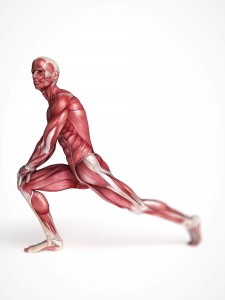 Whenever an injury occurs in the body, fascia adheres to itself and to other soft tissues. For example, many of you have had or heard of Plantar Fasciitis. This soft-tissue condition usually takes a long time to heal. It can also re-occur or leave lingering difficulties for years. If specific fascial work is not utilized as a part of the healing process than full recovery is an improbability. You may find that there is still a range-of-motion (ROM) limitation or some form of discomfort left in the area. Hydration, stretching and proper nutrition are the only effective ways to heal the contracted, unhealthy areas.
Whenever an injury occurs in the body, fascia adheres to itself and to other soft tissues. For example, many of you have had or heard of Plantar Fasciitis. This soft-tissue condition usually takes a long time to heal. It can also re-occur or leave lingering difficulties for years. If specific fascial work is not utilized as a part of the healing process than full recovery is an improbability. You may find that there is still a range-of-motion (ROM) limitation or some form of discomfort left in the area. Hydration, stretching and proper nutrition are the only effective ways to heal the contracted, unhealthy areas.
Fascia is composed mostly of water with proteins and proteoglycans. Fascia is made up of 70 percent water which is why hydration is part of the healing protocol. The two proteins, collagen and elastin, provide structure and elasticity to the fascia. Proteoglycans hold the water in the fascial system to keep it supple. We know these proteoglycans as glucosamine and chondroitin taken as joint supplements. All these materials combine to create the fascial network.
Fascia is a tough connective tissue that envelops every muscle, nerve and organ in the body which separates and binds our structure. If you look at a chicken breast the tough whitish, metallic sheet or think of the pulp and white fibrous material of a citrus fruit this is what fascia is. Fascia even intertwines with muscle fibers and continues throughout the tendon to the bony attachment. Ligaments, which attach bone to bone, are considered to be a type of fascia.
At optimum health, fascia has a gelatinous texture which allows an incredible amount of pushing, pulling or compression without being torn or crushed. At healthy levels, fascia allows muscles to slide past each other without restrictions resulting in a smooth, free motion. Manipulation of any type including massage or stretching, makes the tissue more gelatinous and increases the fascia’s mobility. This means you can create a positive impact on the physical state of your fascial system.
Think of the fascial network as a road map, every highway, secondary road, dirt road and driveway is a muscle, tendon, ligament or various other soft tissue systems in which communication and movement are regulated. Too little of a supplement or water can create a traffic jam of inflammation or just restricted movement. This unhealthy state can result in a torn muscle or ligament or the inability to hold correct posture to just name a few. An unhealthy state could impact your bones, all of your organs and your vascular system.